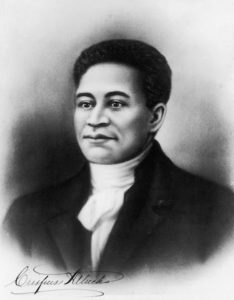
Crispus Attucks
On this date in 1723, we celebrate the birth of Crispus Attucks, a Black merchant, dock worker, and patriot.
Little is known about Attuck's early years. He was born a slave in the (then) colony of Massachusetts. His father, Prince Yonger, was African, and his mother, Nancy Attucks, was Native American (Wampanoag).
In 1750, as a slave of William Brown of Framingham, he was a successful horse and cattle trader who did business with white men. He used his money to buy freedom from his refused owner, and Attucks ran away. He was never caught; nothing was known for nearly 20 years before he resurfaced. Historians guess he escaped to Nantucket, MA, and sailed as a harpooner on a whaling ship.
During those years, the American colonies resented buying almost everything from England and were unhappy about the lack of free trade. The most outspoken protests came from the Massachusetts Colony. The British King, George III, sent two regiments into the Boston Harbor in the fall of 1769. Many conflicts with the citizens of Boston resulted, and one involved Attucks, who was living in Boston. On March 5, 1770, Attucks was eating dinner when a fight between Boston men and British soldiers started. He went to Dock Square to investigate.
It has been said that he picked up a stick and shouted to the crowd gathered there to follow him to King Street. Attucks went to the front of the crowd and struck one of the British soldiers when they arrived. The soldier fatally shot him twice. Four other men were also killed, and six more were wounded. This episode is known as the Boston Massacre. The next day, Attucks' body was taken to Faneuil Hall, and two days later, all the businesses were closed for his and the other victims' funerals.
In 1888, a Crispus Attucks monument was erected on Boston Common. In 1996, President Clinton enacted a Black Patriots Coin Law to commemorate black contributions to the founding of America. The coin was struck in 1998, the 275th anniversary of Crispus Attucks's birth, the first man to die for America's freedom.
American Battlefield Trust.org
The African American Desk Reference
Schomburg Center for Research in Black Culture
Copyright 1999 The Stonesong Press Inc. and
The New York Public Library, John Wiley & Sons, Inc. Pub.
ISBN 0-471-23924-0
Reference:
The African American Atlas
Black History & Culture an Illustrated Reference
by Molefi K. Asanta and Mark T. Mattson
Macmillan USA, Simon & Schuster, New York
ISBN 0-02-864984-2